Group slams ‘misleading’ data by DepEd on preparedness for online learning

MANILA, Philippines — A teachers' group on Wednesday slammed the Department of Education for making what it called a misleading claim about the preparedness of schools for the online modality of distance learning.
The Alliance of Concerned teachers was referring to an education official's claim that 93% of public schools nationwide are equipped with devices for online learning.
"There are 1,042,575 devices in 43,948 public schools all over the country. These are computers, laptops, tablets that can be used by learners," DepEd Information and Communications Technology Service Director Abram Abanil said during a virtual briefing on Monday.
Abanil added that the department was set to deliver 211,344 more devices before 2020 ends.
However, ACT said that this data obscures the fact that "available computers at schools are outdated, if not no longer functional, and cannot be utilized for online learning."
“DepEd is talking about the computers in computer labs which had been bought years ago through DepEd's old computerization programs. Worse, many schools still don’t have computer laboratories until now," ACT Philippines spokesman Benjamin Valbuena said.
“At best, these claims made by DepEd are puzzling to us and disturbing at worst. This seems like a sly, deliberate misrepresentation of tech availability and usability in schools. Instead of reassuring the public with distorted facts, we urge DepEd to bare the sorry truth of our schools—this way, we can perhaps work together in demanding better budget allocation from the national government,” he added.
'Limited, outdated gadgets in public schools'
Valbuena, a retired technology and livelihood education public school teacher, said that even when computers and other gadgets are available in schools, they are often lacking in both number and performance.
"Teachers can attest to the limitedness of these gadgets in terms of quantity and quality, with a computer-student ratio of up to 1:5 per class and these typically only run basic and offline software,” he said.
In late May, DepEd Undersecretary for Administration Alain Pascua told the Senate that there were 1,042,575 devices distributed among 44,155 public schools. He added that, of these devices, 99,548 are laptops, 308,150 are tablet PCs and the rest are desktops.
However, Valbuena contested that a large number of schools utilize a server-client system for their laboratories, "which means that several client computers are mostly controlled by a server computer run by the teacher."
He emphasized that without the teacher-run server computer, the rest of the computers cannot be used.
“This means students can’t take [the computers] home for distance learning, nor can teachers who are under the [work from home] scheme," Valbuena said.
"The few available tablets for students, on the other hand, are so ‘low-tech’ that they can only use Microsoft apps, while online apps will cause lagging. Some teachers who flocked to schools with the intent of using these were dismayed to find poor to totally no internet connection installed at schools,” he added.
According to Valbuena, data collected from the group's ground reports reveals that even national high schools, usually the largest in their division, have either limited or no available gadgets.
"Magsaysay National High School in Northern Samar, Region VIII does not have a computer laboratory to this day, while Magallanes National High School in Sorsogon, Region V only has 15% functional units," he said.
Valbuena further cited reports from Region VII which "showed that in many cases, school computers hardly work—of which, several [need] to be repaired and upgraded, while others reported that only host computers work."
The group also logged a reported lack of internet connection in schools in Region VII or Central Visayas. — Bella Perez-Rubio
- Latest
- Trending






























